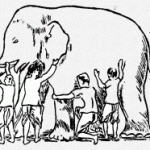Mortality’s Mirror
 Recent events in my life have reminded me of an excerpt from a presentation given by neuroscientist Sam Harris entitled “Death and the Present Moment.” Harris gave this presentation at the 2012 Global Atheist Conference in Melbourne, Australia. The passage below is the part that resonated with me:
Recent events in my life have reminded me of an excerpt from a presentation given by neuroscientist Sam Harris entitled “Death and the Present Moment.” Harris gave this presentation at the 2012 Global Atheist Conference in Melbourne, Australia. The passage below is the part that resonated with me:
Most of us do our best not to think about death. But there is always a part of our minds that knows this can’t go on forever. Part of us always knows that we are a doctor’s visit away or a phone call away from being starkly reminded of the fact of our own mortality, or that of those closest to us…you must know how uncanny it is to be thrown out of the normal course of your life and just be given the full-time job of not dying, or caring for someone who is. The one thing people tend to realize at moments like this is that they wasted a lot of time when life was normal. It’s not just what they did with their time—it’s not just that they spent too much time working or compulsively checking e-mail, it’s that they cared about the wrong things. They regret what they cared about. Their attention was bound up in petty concerns, year after year, when life was normal. This is a paradox of course, because we all know this epiphany is coming. Don’t you know this is coming? Don’t you know that there will come a day when you’ll be sick or someone close to you will die, and you’ll look back on the kinds of things that captured your attention, and you’ll think ‘what was I doing?’ You know this, and yet if you’re like most people, you’ll spend most of your time in life tacitly presuming you’ll live forever. It’s like watching a bad movie for the fourth time, or bickering with your spouse. These things only make sense in light of eternity. There had better be a heaven if we are going to waste our time like that (Harris, “Death and the Present Moment,” Atheist Foundation of Australia, You Tube, 17:58-20:16).
I have recently been forced to gaze into mortality’s mirror. I will be 50 years old next January, and am acutely aware that there are fewer years ahead than there are behind, but it was not facing my own mortality that prompted me to write this, but rather the mortality of a family member. This reality will no doubt be familiar to many of you. She is 85, slowly losing command of her mental and physical faculties due to a myriad of health concerns. She faces the daily realities of her changing life courageously, but it is difficult to watch a once vibrant and independent woman evolve into someone who is not allowed to live alone due to the risk of falling; someone who can barely get in or out of a chair; someone who can take several minutes to shuffle slowly across a room while clinging to a four-wheeled walker with brakes; someone who can no longer go to the bathroom alone and must wear adult diapers due to incontinence. She is someone who is loved, and the hearts of those who love her are slowly breaking as they watch the person she was slip away. She thanks those around her profusely for their help during this “healing time” as she calls it, believing that she will be back to her spry old self once again once she “recovers.” Those who love and support her know that she won’t be recovering. Her condition will only worsen in the months and years to come, not only due to the ongoing ravages of aging, but also due to her recently diagnosed Parkinson’s disease. Processing the emotions generated by this situation has been difficult for me, and I have been ashamed at times at how I have felt.
I have been ashamed of my frustration that this relative did not prepare better for this eventuality by putting her affairs in order, so that her children were not burdened with taking over responsibilities that were hers to manage, putting their own lives on hold to do so. At the same time, as Harris suggested, we believe that we will live forever, and don’t think about our decline and death regularly. It’s not a pleasant thing to contemplate when there are other more enjoyable experiences to fill the time of our days. Who am I to judge her? She didn’t want to think about what her future might bring; she chose instead to live in the present and make the most of the days she had still available to her in ways that brought her joy. What’s wrong with that?
I have felt shame at my anger that after her children have put considerable effort into helping her manage everything that she should have kept better track of, she still has the audacity to complain about things to them. It doesn’t happen often, but it happens. Granted, she has been through a lot. Granted, she is feeling her own great sense of frustration at losing abilities that she so long took for granted. Who am I to feel anger or frustration? I still have command of my mental and physical faculties; I’m not living the daily hell she is. Should I face the loss of my abilities to see well, hear well, chew effectively, walk with effective balance, control my bladder and its associated functions, and enjoy the full command of my long and short term memories, I imagine that it may be difficult for me to muster a sense of joy in the morning at facing yet another day.
Her husband died 22 years ago; she has been living alone ever since, not having been shown how to manage the aspects of their lives that he handled for both of them. She made the most of her own retirement, traveling with friends and other relatives, all the while not wanting to tackle something like downsizing her home or getting rid of the accumulated “stuff” from her former life, as if clinging to it would somehow keep part of it alive. Then it was suddenly too late for her to physically or mentally handle getting rid of any of it. A lifetime of accumulated stuff sits in her house two hours away from the family group home where she now resides, waiting for her children to find time in their lives to figure out what to do with it, and with the house itself. She is of no help, as she lacks the physical strength or mental capacity to even begin to contemplate what to do about any of it.
As events continue to evolve, I often catch myself thinking of an episode of Star Trek: The Next Generation that grapples with a similar theme to the situation my family faces. Below is a brief synopsis of the episode from Wikipedia:
Set in the 24th century, the series “Star Trek: The Next Generation” follows the adventures of the crew of the Federation starship Enterprise. In this episode, Lwaxana Troi (Majel Barrett) falls in love with Timicin (David Ogden Stiers), a Kaelon scientist who is attempting to test his theories of stellar ignition in the hopes of saving his world’s dying star. The experiment fails, and Lwaxana encourages Timicin to continue his research, but as he is about to turn sixty years of age, he prepares instead for a ritual suicide. According to Timicin’s cultural tradition, his people voluntarily choose euthanasia to prevent the aged from becoming a burden to the younger generation.
The alien doctor in the episode knows that he is the only one who has the expertise to carry on his work. He requests asylum aboard the Enterprise so that he can do so, which nearly ignites an interstellar war. The doctor’s own daughter comes aboard and demands that her father be released so that he can die voluntarily as their culture dictates he must. They call the ceremony “The Resolution.” In the end, Timicin surrenders and returns to his people to diffuse the situation. Now, I am in no way endorsing that our country (or any country) adopt such a system. At the same time, the episode gives food for thought. How much of the needs of an older generation should the members of the younger one be expected to shoulder? The character from the episode named Lwaxana, who is even older than Timicin, debates the matter with him below:
LWAXANA: What about the responsibility of caring of the elderly?
TIMICIN: That would place a dreadful burden on the children.
LWAXANA: We raise them, we care for them, we suffer for them. We keep them from harm their whole lives. Eventually, it’s their turn to take care of us.
TIMICIN: No parent should expect to be paid back for the love they’ve given their children.
LWAXANA: Well why the hell not? (to the replicator) Oskoids.
TIMICIN: What’s that?
LWAXANA: (eating) Oskoids. A Betazed delicacy.
TIMICIN: Looks very interesting.
LWAXANA: You should have tried it while you were still alive. No reason to bother now. Why sixty? Why not sixty two, or fifty eight?
TIMICIN: A reasonable age had to be set.
LWAXANA: But it’s not reasonable. Certainly not in your case. You’re as vital and healthy a man as I’ve ever known.
TIMICIN: That is why I wish to say goodbye to my family and colleagues while I am this way, in complete command of my faculties, knowing they will always remember me as a strong and vigorous man.
LWAXANA: But it makes no sense. Some of your people could still be active at seventy or eighty, and others might be seriously ill at fifty. How cruel of you to make them wait so long to commit suicide.
TIMICIN: Setting a standard age for the Resolution makes it uniform for everybody. To ask individual families to decide when their elders are to die, that would be heartless.
LWAXANA: I agree. Why not let everybody die when they die.
TIMICIN: Lwaxana.
LWAXANA: You have a grandson, you said.
TIMICIN: Yes, almost seven.
LWAXANA: Well, wouldn’t it be better for him to know his grandfather? Not some vague memory of someone who once loved him, but a real living person who does love him. Don’t you really think that would be better?
Those of us who are parents chose to have children. We chose to assume the burden of responsibility that comes with caring for them. That choice did not have to be made, and it was a choice they as children did not have. They did not ask to be born, or to have the burden of caring for us. I share some of Timicin’s perspective in that I just can’t bear the thought of my children having to sacrifice even part of the lives they have built to care for me when I can no longer care for myself.
Recently, the relative I have spoken of suffered a fall that resulted in an injury above her eye that required stitches. She was fortunate that she didn’t break a major bone. All the same, the fall resulted in a trip to the emergency room and a lengthy stay in an assisted living facility until she could handle moving about on her own again. Her physical therapist determined that she could never again live completely on her own in an unsupervised situation. The event changed her life again, and not for the better.
Once while pushing her in a wheelchair from one medical appointment to another, one of the nurses working with her, who sees this kind of situation on a daily basis, remarked that she and her colleagues contemplate just stepping in front of a bus before they come to a similar pass. I think (hope) she was kidding, but I sympathize. I don’t ever want to be in my relative’s situation. Ever. Yet I can’t really control how things will play out for me. As I stare into mortality’s mirror and see an aging man staring back at me, here are some of the things on which I have started to reflect.
First, I do not want to be a burden to my children or family as I age. Though I cannot control all of the variables here such as suddenly contracting a degenerative disease or suffering an accident that permanently incapacitates me, there are things I can control that might make it easier. I can start downsizing now, keeping the accumulation of material possessions under control so that I have very few things I need or value that will have to be sorted out or distributed by others, interrupting their lives which are no doubt going to be busy enough with their own affairs. I have never been one to place great sentimental value on things such as tables, chairs, or other pieces of furniture. The house in which I reside is something I can leave behind me without a great deal of emotional turmoil. The memories of special times spent there will go with me no matter where I go.
Secondly, I want to have my affairs in order so that I can say “There is a binder on the shelf that has in it all the information you will ever need to help take care of me should you need to.” Anything caregivers or relatives of mine will need to know regarding financial or medical information will be there. I am not a person who has many strong opinions, so I believe I will be able to roll with almost any decision my wife or children make with regard to what I should do as I age. I will have no problem whatsoever giving up driving when I become a danger to others on the road. I would give it up today if we had a better mass transit system where I live. I will move into any facility that is affordable and appropriate to the needs I have when those looking after me think it would be wise. I will endeavor not to complain, and feel lucky to have what I do, whatever it is.
Sure, you say. All of this is easy for me to say now. When faced with the reality of it, will I not go kicking and screaming, unwilling to surrender my freedoms and sense of individuality? Will I not, as the Dylan Thomas poem tells us, “rage, rage against the dying of the light”? On some level, maybe. I do know my personality, though, and the thing that gets under my skin more than anything else is inconveniencing other people in any way. I will not become a burden—I will yield to what is easiest for others to arrange; they will already be feeling a lot of stress in such a situation. Why would I add to it? All I will need is some books or a library card to keep my mind as sharp as it can be kept, and I’ll be good.
I hope I die suddenly and painlessly. I hope to go while I still possess a reasonably full command of my mental and physical capabilities. I do not wish to experience a slow and inexorable decline in my quality of life. There will come a time when it is not a “life” at all, but a mere existence, where all I can do is consume resources and inconvenience others. I will be suffering, those around me will suffer as they watch me decay, and that is an undignified end to what I hope will have been a meaningful, productive life. It is not how I wish to be remembered. Unfortunately, I can’t ultimately control how it happens–only how I meet it.
I am a Spiritual Naturalist, and have no reason as of yet to believe I have some manner of soul separate from my corporeal mind and the consciousness I experience. I certainly have been given no evidence for belief in some manner of afterlife. This life is what I have. As I gaze into mortality’s mirror, that certainty galvanizes me all the more to ensure that every moment I have left in the one life that I have been given must be spent working to improve myself and the lives of others. I must have a purpose, and devote myself to that purpose for as long as I possibly can. If I lose the ability to do the job I do, where I can no longer mentally and physically serve the students in my charge, I will then step away. At that time, I will assess what skills and abilities still remain to me, and I will find a way to employ them in the service of others. My greatest fear is to merely exist, unable to give back through meaningful service. Service to others is a major aspect of my spirituality.
I have many colleagues who are close to, or speak often of, their retirement. Though I have many years left in the career I am in before I can even think of retiring, I for one do not look forward to it. I personally do not find pleasure in self-indulgence—I have a duty to serve, and have no desire to give it up. Why wait until retiring before you seek to do the things you wish to do? My family and I have traveled the world, making the sacrifices necessary to enjoy those experiences together while we all still have the stamina and abilities to make the most of them. If you wait until you retire, there is no guarantee you will even be able to do those things you look forward to. The future is uncertain. Make the most of the time that you have, so that when you look into mortality’s mirror, you will not see regret in the eyes staring back at you.
My aging relative has every reason to treat those around her with resentment given her situation. The existence she endures seems to involve little more than slowly and painfully walking from room to room, eating simple, repetitive food, going to the bathroom—every seemingly mundane task becoming a lengthy and challenging chore. Her senses and mental acuity are failing her, and there seems very little left in her life to motivate her to soldier on from day to day. However, the moments of frustration she shows are few. She smiles, laughs, and expresses great appreciation for all that is done for her. She thanks people profusely for the simplest things, and finds ways to stay engaged with the world. Even though it looks as though her existence lacks meaning or fulfillment, she is able to do one thing that many others far younger than she seem unable to do, and that is inspire people. Her optimism makes you wonder why it is that those of us who have full command of the magnificent bodies and minds which have evolved for us can pity ourselves, waste our time, and fail to take advantage of the opportunities that present themselves while we still can.
As Sam Harris told us, the day will come when we will be staring into mortality’s mirror, and we will wonder then just what it was that we were thinking. We won’t live forever. Bring meaning to your life in every moment of every day, plan as best you can for the day when you will no longer be able to, and face whatever reality comes your way with dignity and laughter so that you can continue to inspire those around you. Live your spirituality, so you can tell death that you’re ready, free of regret, and love what you see in the mirror.

















